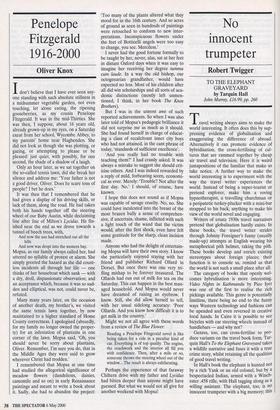Penelope Fitzgerald 1916-2000
Oliver Knox
Idon't believe that I have ever seen any- one standing with such absolute stillness in a midsummer vegetable garden, not even touching, let alone eating, the ripening gooseberries, as my cousin Penelope Fitzgerald. It was in the mid-Thirties. She was then, I suppose, about 16 years old, already grown-up in my eyes, on a Saturday exeat from her school, Wycombe Abbey, to my parents' home near Hughenden. She did not look as though she was plotting, or gazing, or attempting to please or be pleased: just quiet, with possibly, for one second, the shade of a shadow of a laugh.
Only an hour later, as we sat together on the so-called tennis lawn, did she break her silence and address me: 'Your father is not a good driver, Oliver. Does he scare tons of people? I bet he does.'
It was then that I remembered that he had given a display of his driving skills, or lack of them, along the road. He had taken both his hands together off the steering wheel of our Baby Austin, while declaiming line after line of Milton's Lycidas. He fin- ished near the end as we drove towards a tunnel of beech trees, with,
And now the sun had stretched out all the hills And now was dropt into the western bay.
Mopsa, as our family always called her, had uttered no syllable of protest or alarm. She simply greeted the hazard as she did count- less incidents all through her life — one thinks of her houseboat which sank — with a dry, droll, dispassionate observation; and an acceptance which, because it was so sud- den and elliptical, was not, could never be, refuted.
Many many years later, on the occasion of another death, my brother's, we visited the same tennis lawn together, by now maintained to a higher standard of Home County correctness. I apologised (absurdly, for my family no longer owned the proper- ty) for an infestation of plantains in one corner of the lawn. Mopsa said, 'Oh, you should never be sorry about plantains, Oliver. Remember, I'm sure you do, that in the Middle Ages they were said to grow wherever Christ had trodden.'
I remembered that Mopsa at one time had studied the allegorical significance of meadow flowers (dandelions, daisies, camomile and so on) in early Renaissance paintings and meant to write a book about it. Sadly, she had to abandon the project: Too many of the plants altered what they stood for in the 16th century. And so acres of ground as seen in hundreds of paintings were retouched to conform to new inter- pretations. Inconspicuous flowers under the feet of Botticelli angels were too easy to change, you see. Merciless.'
I never had the good fortune formally to be taught by her, never, alas, sat at her feet in distant Oxford days when it was easy to imagine her receiving her degree summa cum laude. In a way the old bishop, our octogenarian grandfather, would have expected no less. Most of his children after all did win scholarships and all sorts of aca- demic distinctions (mostly left unmen- tioned, I think, in her book The Knox Brothers).
But I was in the utmost awe of such reported achievements. So when I was also later told of Mopsa's pedagogic brilliance it did not surprise me as much as it should. She had found herself in charge of educat- ing a class of recalcitrant inner city boys who had not attained, in the cant phrase of today, 'standards of sufficient excellence'.
`And you really had no trouble with teaching them?' I had crassly asked. It was always a mistake to suggest she should crit- icise others. And I was indeed rewarded by a reply of mild, forbearing scorn, economi- cal as ever. Merely: 'Trouble? Not after the first day. No.' I should, of course, have known.
I hope this does not sound as if Mopsa was capable of savage cruelty. No, no. She could have inculcated into the breast of the most brazen bully a sense of comprehen- sive, if uncertain, shame, inflicted with such a light touch of the wand that the victim would, after the first shock, even have felt some gratitude for the sharp, clean incision made.
Anyone who had the delight of entertain- ing Mopsa will have their own story. I know she particularly enjoyed staying with her friend and publisher Richard 011ard in Dorset. But once there was one very tri- fling mishap to be forever treasured. The 011ards had run out of milk for tea on the Saturday. This can happen in the best man- aged household. And Mopsa would never have dreamed of raising an eyebrow, I know. Still, she did allow herself to tell, with her usual sidelong accuracy: 'Poor 011ards. And you know how difficult it is to get milk in the country.'
Might we not all agree with these words from a review of The Blue Flower:
Reading a Penelope Fitzgerald novel is like being taken for a ride in a peculiar kind of car. Everything is of top quality. The engine, the coachwork and the interior all fill you with confidence. Then, after a mile or so, someone throws the steering wheel out of the window...The result is always exhilarating.
Perhaps the experience of that faraway Chiltern drive with my father and Lycidas had bitten deeper than anyone might have guessed. But what we would not all give for another weekend with Mopsa!


































































 Previous page
Previous page